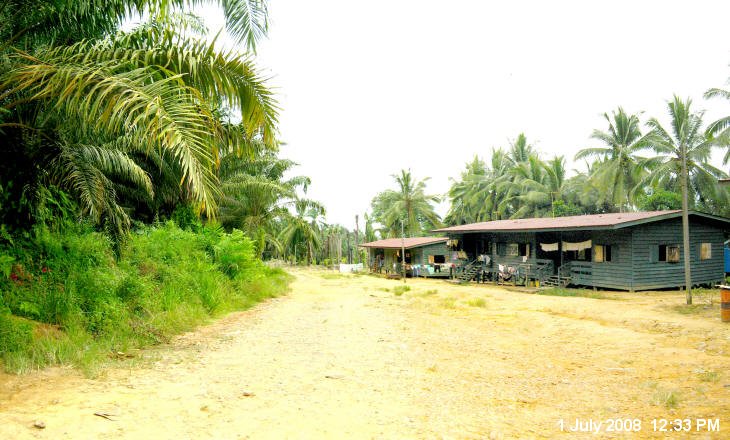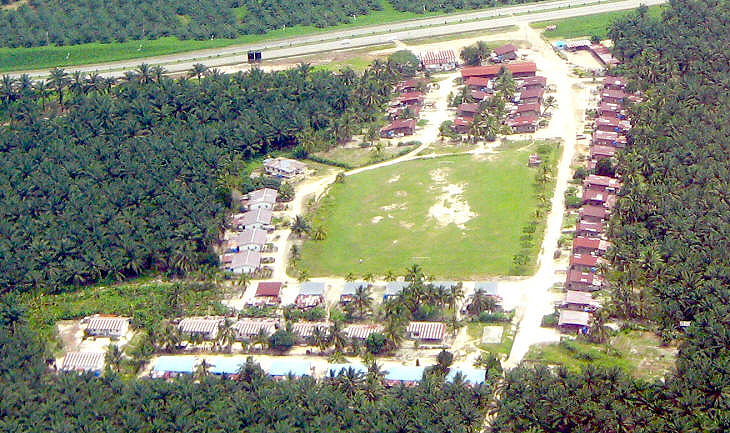
Oil Palm Workers
The life of oil palm workers in Malaysia
Oil Palms in Sabah > Oil Palm Workers

Oil Palm Workers
The life of oil palm workers in Malaysia
The 4 categories of workers in an oil palm plantation:
1- General workers
2- Harvesting workers
3- FFB harvester and collector
4- Field worker
Typical works in an oil palm plantation:
Workers carry out typical plantation work such as
harvesting of ripe fruits;
pruning of oil palms,
applying fertiliser to the palms,
transporting the fruit bunches to the mills
spraying herbicides.
Task of Collecting Fresh Fruit Bunches (FFB)

A FFB collector using a Mini Tractor Grabber (MTG) to load ripe fruits from the
road side to the powered cart
Mini Tractor Grabber (MTG)
To collect the FFB harvested, oil palm workers were assisted by MTG and
mechanical buffalo. MTG is used for areas that are not hilly and easy to access.
This Mini Tractor Grabber (MTG) in above photo is KUBOTA brand.


Oil palm plantation workers' quarter, surrounded by thousands of hectares of oil
palm plantations in Balung area of Sabah
Major findings of the FFM were:
1. Migrant workers remain to be targets of oppression and exploitation. Even
migrant workers with legal working permits have been arrested and detained.
2. From the time they leave their home countries, they are already caught in a
vicious debt cycle as recruitment agencies and employers overcharge them on
processing, visa and levy.
3. Migrant workers are forced into debt bondage as employers, both in urban and
rural areas, hold their passports, deduct from their salaries without any
justification and provide no benefits.
4. Corruption in the Malaysian government agencies has been alleged as
immigration authorities have been reportedly collecting fees from migrant
workers especially at the entry points and Malaysian police receiving or
demanding bribes in exchange for the freedom of arrested migrant workers.
5. This web of deceit and corruption apparently leads to the seemingly easy
inflow of migrant workers who are amassing by the minute despite massive
crackdowns.
6. SUHAKAM, Malaysia’s National Commission on Human Rights, has admitted its
limited capacity to effect change with regard to the situation of migrant
workers. As its representative has stated, the Malaysian government itself does
very little in resolving the problem and has, in turn, become part of the
problem.
7. Indonesian migrant workers have little trust for the Indonesian Consulate’s
capacity to address their problems. From marriage issues to urgent labor
concerns, the Indonesian Consulate in Sabah has remained inconsistent and hence
unreliable in providing support to Indonesian migrants.
8. While a memorandum of agreement exists to ensure Indonesian migrant workers’
rights, a problem ensues with one stipulation in the agreement allowing
employers to hold their employees’ passports.
9. The establishment of Sekolah Indonesia Kota Kinabalu is a recognized
development in the agreement between Malaysian and Indonesian governments to
provide education to Indonesian children. While tuition is free, certain aspects
of the program remain problematic, pertaining to the migration status of the
children, the proximity of the school to migrant workers’ communities, among
others.
10. There are more school-age children and youth in plantation areas yet
provision of education is much more difficult due to a number of reasons:
distance of the plantations from urban areas, lack or absence thereof of
electricity, lack of access to needed materials, lack or absence thereof of
school facilities, among others.
11. There is no functioning Philippine Consulate in Sabah due to the contention
between the Philippines and Malaysia on the Sabah islands.
12. While a temporary working office in Kota Kinabalu has been established,
services to migrant workers will depend mainly on the availability of the
consulate representatives themselves.
13. The Philippine government’s ’s four-person team in Sandakan only provides
passport services to its constituents. It is found out, however, that certain
private establishments provide the same services and with the knowledge of the
head of the four-person team.
14. No update has been obtained with regards to the mechanisms created by the
Philippines-Malaysia working group as the Philippine Consulate representative
chooses not to comment on the matter while the representative from SUHAKAM has
denied any knowledge of such working group.
15. Trafficking of women and children has been noted through interviews made
with migrant workers.
16. Institutions of faith (e.g. Roman Catholic, Anglican) with its organizations
are the only existing groups in Sabah that provide assistance and refuge to
migrant workers. Aside from the team by Tenaganita based in Tawau, there are no
non-secular organizations that cater to the demands and needs of migrant
workers.
With such findings, there can be no doubt that advocacy, organizing and
education work for migrant workers in Malaysia are very much imperative.
Services also should be made available to those who encounter abuses or any type
of problems as a worker.
Malaysia indeed is deserving of its reputation as one of the worst areas where
migrants are treated as no less than slaves with very minimal rights and
protection. It is hoped that with the FFM, advocacy for migrants will be
strengthened and actions would be taken to alleviate their plight.#
This is reprinted from APMM News Digest, June 2009. Monthly Newsletter of the
Asia Pacific Mission for Migrants (APMM).
Retrieved from
www.apmigrants.org
Source : http://www.barubian.net/
A Wedding Ceremony in an oil palm plantation in Malaysia
RELATED TOPICS
|
|
Oil Palm in Malaysia |